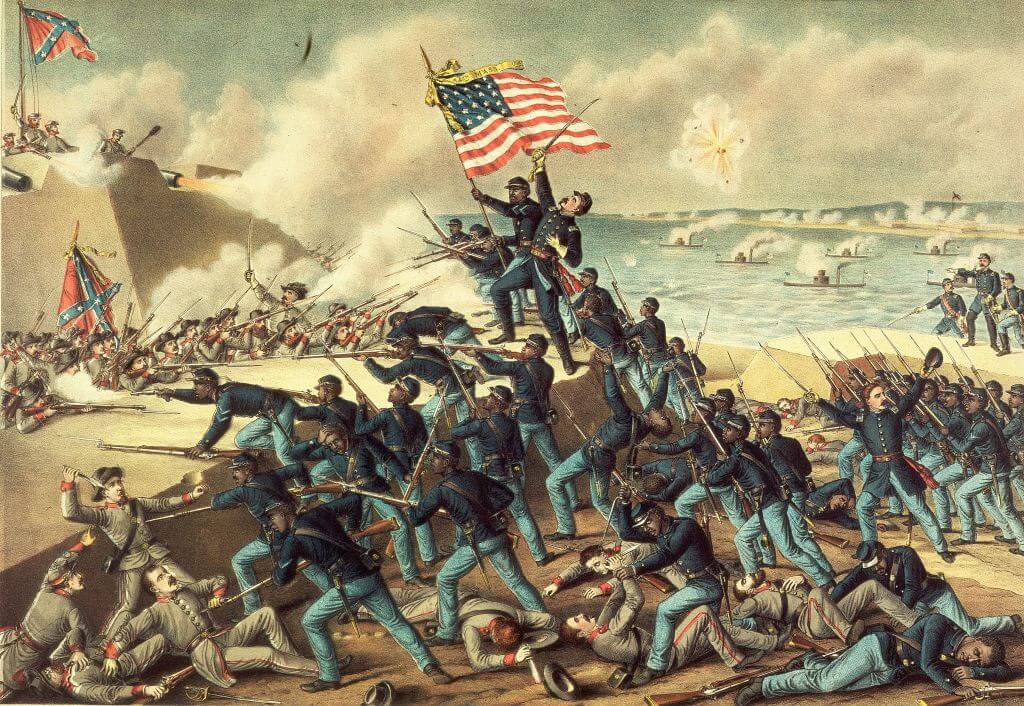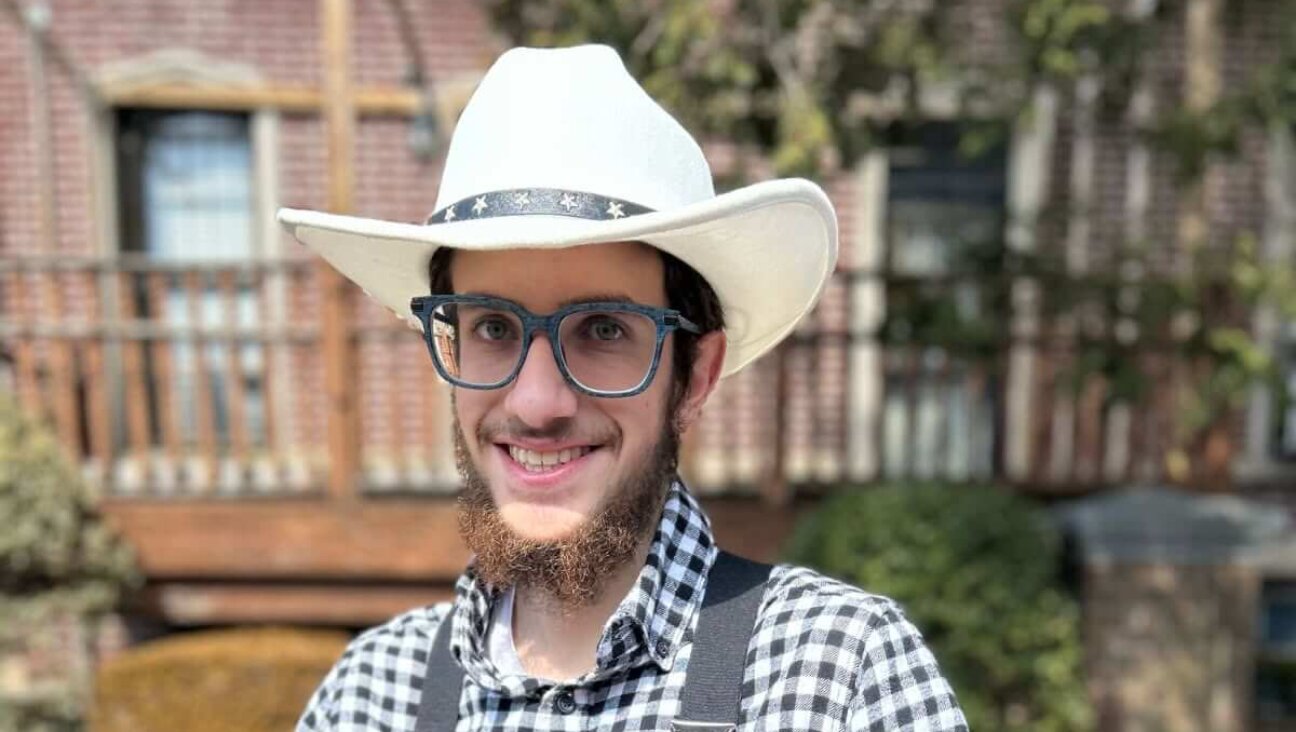A New Jersey Tale of Two Alfred Doblins — and One Umlaut

Graphic by Angelie Zaslavsky
I was dozing in front of the TV when I lifted one eyelid to see Rachel Maddow interviewing a man with a trim beard and a startling name: Alfred Doblin. They were discussing Chris Christie and the Bridgegate scandal. Maddow described her guest as the editorial page editor of the Bergen Record, a New Jersey newspaper.
Suddenly wide awake, I pulled a thick German novel from a nearby shelf. “Berlin Alexanderplatz” was its hard-edged title. The German Jewish novelist who wrote it: Alfred Döblin.
Döblin (1878-1957), along with Thomas Mann and Bertolt Brecht, was one of the writers who talked back to their traumatic era with originality and power. This Alfred Doblin turned out to be his grandson. I wondered whether Doblin, the editor with no umlaut to his name, took more interest in Döblin, the German novelist, than others in a literary world — especially the English-speaking one — who have largely overlooked him.
When I reached him at the Record, he made it clear he did. He called Döblin a “varied writer” and a “highly evolved person,” but said he wasn’t a scholar of Döblin’s vast oeuvre — more than a dozen novels, along with plays, nonfiction books, essays and short stories — accessible mostly to those who read German. He spoke thoughtfully of “Berlin Alexanderplatz,” an urban epic that appeared in 1929 and became Döblin’s one bestseller. Walter Benjamin and other critics called him a modernist master for the story of Franz Biberkopf, an everyman freed from prison after serving four years for manslaughter of his girlfriend. Capable of tenderness, he tries to go straight but gets sucked back into the criminal shadows of Weimar Berlin, stealing and pimping.
The novel linked individual experience to the mass forces that shaped it, using newspaper headlines, advertising slogans, popular songs, even weather reports. It embraced Bible stories and folk legends, but sustained empathy for those who lead hard lives, which perhaps was inspired by Döblin’s work as a physician who practiced in a working class district. Brecht, 20 years younger, wrote him on his 60th birthday about the “extraordinary zeal with which I have studied your literary works and appropriated the numerous innovations you have made.”
If Döblin came close to having a revival, it was after Rainer Werner Fassbinder’s monumental West German television series based on the novel, released here theatrically in 1983 and described by some critics as far more Fassbinder than Döblin. Still, the English translation that literary gadfly Eugene Jolas made in 1931, which has a mixed reputation, remains the only one. That monopoly has probably hurt the Döblin cause, but there’s hope. Doblin the newsman gave me the big news: “A new translation of ‘Berlin Alexanderplatz’ is being done,” he said.
Edwin Frank, editorial director of New York Review Books, publishing arm of the New York Review of Books, confirmed that the “sorely needed” new translation is coming from Michael Hofmann, regarded as one of the leading translators of German literature. In fact, Frank plans a total of three Döblin translations for 2015, all with the NYRB Classics imprint. One of the others, in col laboration with Chinese University Press, is a 1991 English-language version of Döblin’s first novel, “The Three Leaps of Wang Lun.”
The book, published in 1915, was an imaginative exploration of 18th-century China structured around Taoist ideas about how detached or engaged one should be with the world. The third title, “Cheerful Magic: Early Stories and Late Tales,” will gather the writer’s short fiction, translated by Damion Searls. Frank, who has more Döblin in mind for the future, hopes to repeat the success he’s had raising the ghost of Stefan Zweig for English-reading audiences. Just by bringing out the three books he will please Döblin devotees who bemoan that BA (as it’s fondly abbreviated) has eclipsed his other work.
Döblin was a one-man advance team for what we call world literature. He combed libraries for his China novel. Equally bold were “Manas,” a 1927 verse epic drawn from Indian mythology — which he said led him to the modern myth of “Berlin Alexanderplatz” — and “Amazonas,” a trilogy about the colonization of Latin America.
He made the human drive for power behind technological progress a theme for “Wadzeks Fight with the Steam Turbine,” and “Mountains Oceans and Giants” found the author flinging himself into the future with a kind of science fiction saga new to German writing.
Nonviolence and coexistence with nature were Döblin ideals. His short fiction improvised on the German fairy tale tradition, as the upcoming NYRB title suggests. Critical responses to most of his novels ranged widely. Robert Musil, writing his “The Man Without Qualities” when he reviewed “Manas,” deemed it a great work. Others, according to a study of the major novels’ critical reception by the scholar Wulf Koepke, called it a grandiose bore. The writer of epics could also distill his ideas into aphoristic gems that have found their way into cyberspace in English: “Cities are the principal home and seat of the human group. They are the coral colony for Man, the collective being.”
Döblin was born to an assimilated Jewish family in Stettin, now the Polish city of Szczecin, the second of five children. His musically talented father abandoned the family for a younger woman when he was 10, an event whose trauma echoes through his work. His mother moved the family to Berlin, where she had a well-off brother. The novelist spent World War I as a military doctor, and witnessed Germany’s political upheaval at the war’s end.
During the Weimar era, he wrote biting newspaper columns from a leftist perspective that were read across the city. In 1924, driven by what he described as “pogrom-like events” in 1920s Berlin in which “Nazism let out its first shriek,” he traveled to Poland to learn about its Jews. The result was a moving account of politics, culture and everyday life. The book, “Journey to Poland,” can be read in a strong translation by Joachim Neugroschel.
The trip filtered into his fiction: Franz Biberkopf wanders in a gloom that feels like solitary confinement after he leaves prison, until he meets a Jew who asks a fellow outsider: “What’s the matter, anything wrong, are you in pain?” It’s the Jew who assures him he’ll survive: “You’re not going to go under. Berlin is big. Where a thousand live, one more can also live.”
Döblin was 50, respected but not famous, when he finally had a huge hit with “Berlin Alexanderplatz,” but it appeared in October 1929, just before the stock market crash in New York and the Great Depression spread across America and Europe, paving Hitler’s way to power in 1933. Döblin responded to the Nazis with essays about Jewish issues. One recalled his mother whispering Hebrew prayers to herself, another extolled Zionism as “the will to a total Jewish existence,” though he worried a Jewish state could become a fetish and fail to answer spiritual problems.
Döblin, one of whose sons, Wolfgang, died fighting for the French early in the war, and whose brother would perish in Auschwitz, found his way to Los Angeles in 1940, but the promise of film work faded. He struggled with English. He and his wife, Erna, almost ran out of money and his physical health deteriorated. He stayed close with others in the so-called Weimar on the Pacific, including Brecht, who wrote in a 1942 journal account that he “fought to retain his sharp Berlin sense of humor.”
In Los Angeles, Döblin made what must remain, especially for Jewish readers, his most provocative move — he converted to Catholicism. Refugee friends were shocked. A closer look suggests that his conversion resulted from a lifetime of spiritual searching.The question of religion, he wrote Martin Buber in a letter, was “not a matter of land and state and political homeland,” but belonged to the “eternal foundation of what I and you call God.”
This Catholic’s only publication in his five American years was called “Living Thoughts of Confucious.” He also completed “November 1918,” a trilogy of novels about the month World War I ended and hopes for a socialist revolution in Germany were crushed. He read Friedrich Nietzsche and Walt Whitman.
After the war, he went home to Europe, but ended up quoting the American novelist Thomas Wolfe that such a return was impossible. Germans he met were unapologetic about Nazism. His last novel, “Hamlet, or the Long Night Comes To An End,” about a wounded British soldier returning from World War II, was published in 1956. It won a degree of critical praise he hadn’t known in decades. He died the next year in a clinic in the Black Forest; his grave bears a cross.
The Döblins had four sons. The oldest, Peter, was the editorial editor’s late father. Though Peter Döblin held on to the umlaut and other traces of his Germanic past, his son says he was “very proud to be an American.” He worked in the composing room of the New York Daily News and raised his family on Long Island. Alfred Doblin was born the year his grandfather died in 1957, and grew up in suburban surroundings where the man once rumored to be listed for a Nobel Prize was unknown, but he says that his father spoke of him.
Planning to become a singer, Doblin “fell into journalism” after college, a career that has won him awards for opinion writing and a TV presence. His crisp but elegant manner as a spectator to the George Washington Bridge story has made him a regular on MSNBC. Amazingly, whatever trouble Bridget Anne Kelly caused with her little email — “Time for some traffic problems in Fort Lee” — she gave the name “Alfred Döblin” wings it hasn’t had since 1929.
Besides managing a staff, Doblin writes a twice-a-week column that can bristle with a Berlin-style wit about the state’s beleaguered governor. He’s become more engaged with his grandfather’s writing lately and feels — though he’s careful to not make too much of it — he’s inherited a thread of his writing impulse from him. He also inherited, and embraced, the Catholicism his father took from his father. His mother was an Italian American from a Catholic background. “I’m very aware of the Jewish tradition and the challenges it faces,” Doblin said. “But it was not a lived experience for me.”
He doesn’t read German and admits he wrestled with the story of Franz Biberkopf at first. Then, about seven years ago, it “just clicked and was one of the easier reads I’ve ever had.” Referring to the book’s filmic methods, he adds: “The camera is rolling and you really feel what Berlin is like.”
In the spring of 2007, the 50th anniversary of his grandfather’s death, Doblin made his first trip to Berlin for a commemorative exhibit about him, and spent two weeks wandering the city. He discovered a large former government building on the actual Alexanderplatz whose façade was imprinted with a long quote from the book. He visited a small street named for Döblin, and had his picture taken beside a “very cool” bronze bust of him in front of the family’s last house before escaping Berlin in 1933. “Going to Berlin, I had a sense of something waiting there for me,” said Doblin. “I was searching for something and felt I could unlock it by walking the streets where my grandfather walked and where my father grew up.”
He brought along “Destiny’s Journey,” a nonfiction work that is one of few by Döblin that have been translated. The writer started it during the war, following the circle from his flight across France just ahead of the Nazis to his return to the bombed-out ruins of the city where he’d written his books and where they were burned. “I read it on the flight to Berlin and while I was there and it sang to me,” the grandson told me.
He noted Döblin’s “powerful passage” about passing the Berlin Zoo:
“The huge restaurant at the zoo, the Wilhelmshallen, has been destroyed. The zoo: an incendiary bomb fell on an elephant here, the animal put up a terrible struggle trying to smother the fire. But the sun shines equally on the just and the unjust, the huge, unsuspecting animal was dragged into humanity’s woes, and died horribly.”
The year of remembering Alfred Döblin ended in November, with a reading at the Goethe-Institut in Manhattan, an outpost for German culture on East 83rd Street. It was a place where Peter Döblin, who died in 1994, at 82, felt at home. Actors read from “Berlin Alexanderplatz.” Doblin also read excerpts from the novel and from “Destiny’s Journey,” and told me in our interview that reading his grandfather’s words in a place his father cared about gave him “a sense of completeness.”
It seemed our talk was complete, but then Doblin shared another detail about the photograph taken of himself with his grandfather’s bust in Berlin. After he returned to New York, he stumbled on a news item online. “It said some criminals had sawed off the bust and melted it down for the bronze, which they do so they can sell it,” he related.
The story was shocking and I tried to be clever, suggesting that the perversity of thieves sawing off Döblin’s bronze head and melting it for cash sounded like it came from “Berlin Alexanderplatz,” a novel driven by mutilations — a limb cut off, a girlfriend chopped up. My musing prompted an editor’s habit of imposing limits. “The story really disturbed me,” Alfred Doblin said. “I don’t want to get into some larger philosophical irony about whether it fits with his writing. I’m just glad I got that picture.”
Allan M. Jalon is a freelance writer based in New York.














